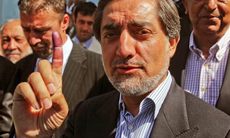 Just when the US administration thought it had turned a corner in Afghanistan by persuading Hamid Karzai to allow a run-off in the presidential elections, things look uncertain again. Having returned from a trip to India, President Karzai’s election rival Abdullah Abdullah looks set to announce he will boycott next week’s second round of voting. Such a decision could either be the prelude to a resolution of the crisis, or set the stage for political crisis. It is more likely going to be the latter.
Just when the US administration thought it had turned a corner in Afghanistan by persuading Hamid Karzai to allow a run-off in the presidential elections, things look uncertain again. Having returned from a trip to India, President Karzai’s election rival Abdullah Abdullah looks set to announce he will boycott next week’s second round of voting. Such a decision could either be the prelude to a resolution of the crisis, or set the stage for political crisis. It is more likely going to be the latter.
Before Karzai was persuaded to allow a run-off, some diplomats I spoke to were suggesting that a power-sharing arrangement could be put in place or the President would be offered a deal: Karzai would acknowledge problems with the first round of voting, something he had until then doggedly denied, while in a quid pro quo Abdullah would withdraw from the race for the sake of national unity. The two ideas could also be merged, I was told: Karzai would accept a run-off, Abdullah would beg off and the two rivals would join forces in a power-sharing deal, Kenya-style.
But if this looked like a good idea a few weeks ago, the shine is coming off the wheeze. For Karzai had to be dragged kicking and screaming towards a run-off and none of the changes needed to make this poll a little more fair — and allowed Abdullah to leave the race — have been implemented.
Though the full list of demands formulated by Abdullah for a second poll may have been excessive, replacing Azizullah Ludin, the head of the Independent Election Commission, was the least that could have been done to secure a fair electoral process. Back in March I came back from Kabul and warned about Ludin’s appointment. His statements since his appointment, initially on the quality of the first round of voting and the likely outcome of a second round –- that Karzai would win –- showed where his loyalties lay and should have disqualified Ludin from the post. But President Karzai has refused to make even this modest concession to fairness.
With only one candidate willing to participate in a second round of voting, it is not certain what the right course of action should be, constitutionally. Many analysts have suggested that, in the event of a candidate withdrawing, the run-off must still go ahead with just the one remaining candidate. The government-run Independent Election Commission has said as much. But such a run-off is likely to garner and even lower turn-out than the first round and any “win” by Karzai would be tainted from the start.
In the spring, I wrote the following about elections:
“In the worst-case scenario, the presidential election is rigged and President Karzai declares himself winner in the face of protests by the opposition and criticism by observers. The international military and civilian presence would then be left propping up an illegitimate government, which would struggle to deliver services or to engage the insurgency.”
After a few weeks of post-election tension, this scenario looks as likely as it did in earlier in the year. In the Asia Foundation’s 2009 Afghan Public Opinion Poll 42% of Afghans thought the country is moving in the right direction down from 64% in 2004, while 29% thought Afghanistan was going in the wrong direction.






Comments